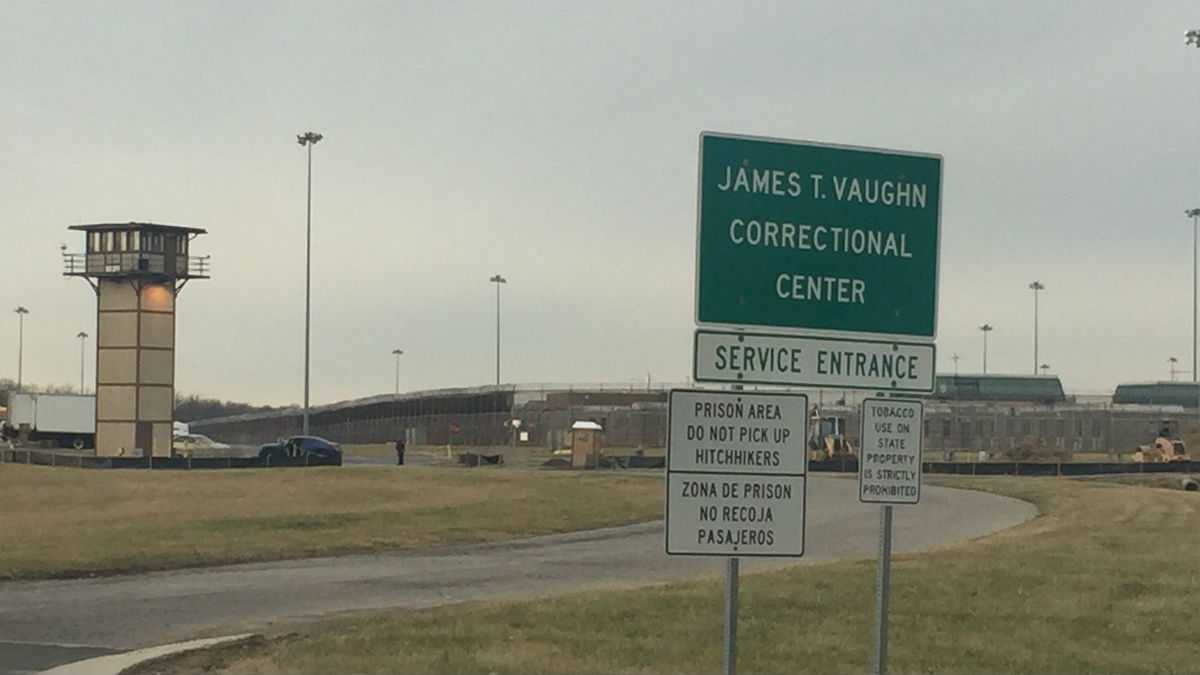Delaware prison riot defendants challenge inmate witness
Royal 'Diamond' Downs recalled attacks on correctional officers and of inmates roaming the James T. Vaughn Correctional Center in bloody clothes.

Four people are charged with murder, kidnapping and other crimes in the February 2017 riot at James T. Vaughn Correctional Center. (WHYY)
Three defendants on trial in connection with the February 2017 prison riot in Delaware that led to the death of a correctional officer grilled a fellow inmate who testified against them Tuesday.
During his second day of testimony, Royal “Diamond” Downs — a convicted murderer who once headed a notorious Baltimore prison gang – recalled attacks on correctional officers and inmates roaming the James T. Vaughn Correctional Center in bloody clothes.
Downs told jurors about each defendant’s role during the riot that led to the death of correctional officer Lt. Steven Floyd, who died of blunt force trauma and stab wounds after he was taken hostage during the standoff.
This is the second week of the expected four-week trial for Jarreau Ayers, Deric Forney, and Dwayne Staats. A fourth defendant, Roman Shankaras fired his attorney, and the judge said Tuesday Shankaras will be tried at a later date.
It is the first of four trials on charges of murder, riot, kidnapping, assault, and conspiracy against 16 inmates in connection with the riot. Two other inmates, including Downs, escaped murder charges.
Shankaras’ previous attorney, Jason Antoine, has called Downs a tainted “star witness’’ who got a cushy plea deal. He is already serving a life sentence, and prosecutors are recommending a sentence of up to three years for a single charge of riot that he pleaded guilty to earlier this year.
On Tuesday, Downs said he chose to testify against his fellow inmates because he couldn’t pass up on an opportunity to turn his life around and be with his family.
“I’m up in age, and different factors in my life … to be sitting in prison for 30 years … to have my conviction overturned, I thought it would be foolish to risk going to court with this case — to only give one life sentence back for another life sentence,” he said. “My grandchildren, I can’t leave them like I left my children. Me giving a statement, that’s the hardest thing I’ve ever done.”
But Downs’ fellow inmates were quick to question the witnesses’ integrity.
Cross questioning began with defendant Ayers, who is representing himself, and was Downs’ best friend — until he became a witness for the state.
Ayers read a police statement in which Downs says he had “no problem” assisting prosecutors in Baltimore and Delaware.
“You just said, ‘This is hard for me,’” Ayers said. “Would you agree that’s a contradiction?”
Downs responded he was never an informant in Maryland.
Downs testified he was on the fringes of the riot and only got involved with negotiations in an effort to “save lives” at the prison.
He also said he asked to speak to negotiators in order to have phones turned on to speak to the press. Downs said the media were the inmates’ only protection, because those in charge were “murderous.” Had the press not gotten involved, he said, the authorities could enter the building and “do damage to some people.”
At one point, he checked on Floyd and heard him moaning, but some inmates in masks would not allow him to help the correctional officer. When he saw Floyd being beaten with a fire extinguisher, Downs said he decided to “step up” and negotiate with law enforcement.
However, defendant Staats, who is representing himself, questioned Downs’ decision to observe the attack, and the fact he was among the last inmates to exit the building.
“It seems like you had to make sure Floyd was dead before you left the building,” he said.
Earlier in the day, Downs testified that Staats handled a large portion of the negotiation process. But the two argued about who told negotiators, “Floyd’s already down, he’s about to be cancelled” and threatened further violence if inmates’ demands weren’t met.
As Staats played an audio clip of the statement, some in the courtroom broke out in laughter at hearing what clearly sounded like Downs’ voice.
“This is not an audience, this is not a game here,” the judge warned them. “If you react inappropriately, you will be out, you will not be able to get back in and be stopped at front door.”
During the trial, the defense has argued Downs was the “head honcho inmate.” Known as the “OG” (Original Gangster) by other inmates, the defense said he has the power to order hits.
On Tuesday, Downs said he agrees with the defense that he has influence within the prison, but insisted he never used his influence for negativity.
In response, Staats showed the witness a transcript of a phone conversation between Downs and his daughter, in which he asks her to hold an ounce of marijuana for him. Downs admitted there were several ways of smuggling drugs into the prison.
“You had to use your influence for negativity right?” Staats said. “You don’t agree you put her freedom at risk for your selfish agenda? If you would do that to her, you don’t care about no inmate or CO do you?”
Earlier that day, Downs described the 18-hour standoff as “chaotic.”
“Just do as you please, do what you want,” he said. “There wasn’t no order at all, this was an opportunity for guys to let their hair down and do what they wanted.”
Downs said he saw Floyd being attacked in the mop closet during the riot, and then being dragged out of the closet and down the hall to his office.
He said he could not remember who was attacking Floyd in the mop closet. Prosecutors wanted to “refresh his memory” with his statements to police, but Judge William Carpenter sustained an objection from the defense.
He said he saw defendant Forney enter the building wearing a mask, and that Shankaras initiated the conversation about staging a protest about the poor prison conditions.
Downs said he witnessed other inmates, who will be on trial at later dates, carrying bloodied shanks and wearing bloody clothes. He alleged one inmate, Lawrence Michaels, told Downs he stabbed Floyd because he tried to fight back. He said another inmate known as “Cut” hit Floyd with a fire extinguisher.
Forney’s attorney will question Downs on Wednesday.
WHYY is your source for fact-based, in-depth journalism and information. As a nonprofit organization, we rely on financial support from readers like you. Please give today.





